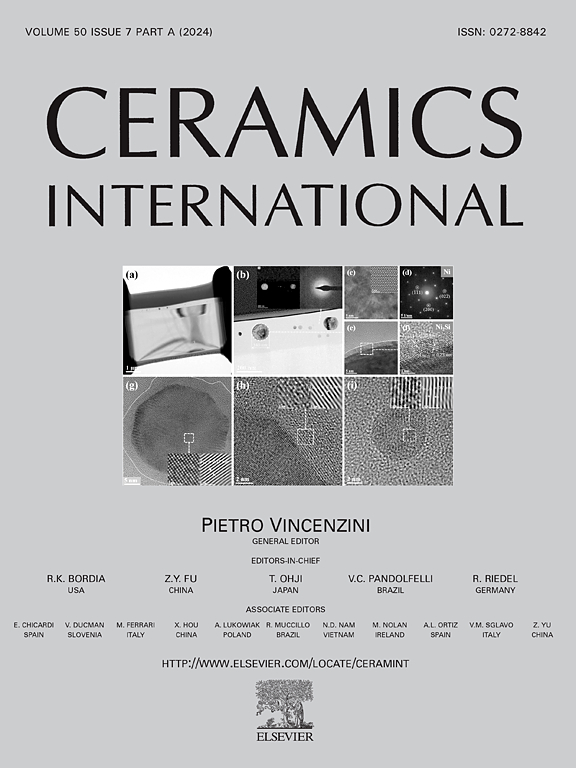Preparation and microstructure of spark plasma sintered Mg4.68Al2.64Zr1.68O12 ternary metastable phase
IF 5.1
2区 材料科学
Q1 MATERIALS SCIENCE, CERAMICS
引用次数: 0
Abstract
MgO–MgAl2O4–ZrO2 composites containing Mg4.68Al2.64Zr1.68 were synthesised from salt lake magnesia powder and fused Al2O3–ZrO2 fine powder using spark plasma sintering. Based on the compound energy model, the Gibbs reaction energy for the MAZ ternary metastable phase (MAZ) was calculated as 163.76–0.0868T. Samples were sintered at varying temperatures to investigate the evolution of physical phases within the materials. Results indicated that the MAZ synthesis ratio increased with increasing heat treatment temperature. Two synthesis pathways were identified for MAZ formation: (1) a solid–solid reaction via MgO and ZrO2 diffusion into MgAl2O4 and (2) a gas–solid reaction where ZrO2 served as the nucleation site, with Mg(g) and Al(g) diffusing to ZrO2.
求助全文
约1分钟内获得全文
求助全文
来源期刊

Ceramics International
工程技术-材料科学:硅酸盐
CiteScore
9.40
自引率
15.40%
发文量
4558
审稿时长
25 days
期刊介绍:
Ceramics International covers the science of advanced ceramic materials. The journal encourages contributions that demonstrate how an understanding of the basic chemical and physical phenomena may direct materials design and stimulate ideas for new or improved processing techniques, in order to obtain materials with desired structural features and properties.
Ceramics International covers oxide and non-oxide ceramics, functional glasses, glass ceramics, amorphous inorganic non-metallic materials (and their combinations with metal and organic materials), in the form of particulates, dense or porous bodies, thin/thick films and laminated, graded and composite structures. Process related topics such as ceramic-ceramic joints or joining ceramics with dissimilar materials, as well as surface finishing and conditioning are also covered. Besides traditional processing techniques, manufacturing routes of interest include innovative procedures benefiting from externally applied stresses, electromagnetic fields and energetic beams, as well as top-down and self-assembly nanotechnology approaches. In addition, the journal welcomes submissions on bio-inspired and bio-enabled materials designs, experimentally validated multi scale modelling and simulation for materials design, and the use of the most advanced chemical and physical characterization techniques of structure, properties and behaviour.
Technologically relevant low-dimensional systems are a particular focus of Ceramics International. These include 0, 1 and 2-D nanomaterials (also covering CNTs, graphene and related materials, and diamond-like carbons), their nanocomposites, as well as nano-hybrids and hierarchical multifunctional nanostructures that might integrate molecular, biological and electronic components.
 求助内容:
求助内容: 应助结果提醒方式:
应助结果提醒方式:


